
Miguel Hernandez cleans a barn on his last day of work on a Pepin County dairy farm owned by Doug and Toni Knoepke. He was leaving for Mexico with four other dairy workers the next day. He said he did not want to work the day before he left, but the farm owners needed the help. At the time, they did not have anyone lined up to replace him as assistant herdsman on the farm. He had worked there for 16 years, making $15 an hour by the time he left.
In the driveway of a two-story house on a dairy farm in western Wisconsin, five men focused on a unique construction project. Using a drill, hammer and nails, plywood and rope, they worked together in the afternoon sun to erect a structure that resembles a makeshift corral in the bed of a Honda pickup.
Luisa Tepole, 25, carried a suitcase or packaged appliance out of the house, handing it to her husband, Miguel Hernandez, 36.
By the end of the night, the back of the truck was piled high with bags of clothes and shoes, TV sets in boxes and a bucket of children’s toys, ready for the 2,300-mile drive to Veracruz, Mexico.
Farm owners Doug and Toni Knoepke watched Hernandez and the other workers from a few feet away as they loaded their two-truck caravan. It looked like a scene from “The Grapes of Wrath,” Doug Knoepke remarked, referring to the movie about the mass migration from the Oklahoma Dust Bowl to California in the 1930s.
Only this time, it was in reverse: The migrants were leaving a land abundant with economic opportunity for an uncertain future in their homeland.
Hernandez worked on the Knoepkes’ farm in Pepin County for 16 years. He shared that home with his wife and two young sons, Thomas, 5, and Liam, 4.
That day, at Thomas’ last day at Noah’s Ark Preschool, he cried as he told his classmates that he will not be starting kindergarten with them in the fall. He had never been to Mexico.
Earlier this month, Hernandez and four other men, who for years had milked and cared for cows on dairy farms among the hills of western Wisconsin, drove away in the direction of their mountainous hometown of Texhuacan. A few days later, Tepole and the children flew out of Chicago.
The Hernandez family left, in part, because of the threat of deportation — which could ban them from returning to the United States for 10 years — and what they described as increasingly harsh rhetoric by President Donald Trump and others toward immigrants, especially those here illegally.
They moved here to America’s Dairyland, the nation’s top cheese state and No. 2 milk producer, attracted by a dairy industry dependent on undocumented immigrant labor to keep cows milked three times a day, year-round. They have raised their children in communities where American workers stopped answering “help wanted” ads for cow milkers long ago.
And now, they have gone home.
“Miguel has been our right hand,” Knoepke said. “He treated (the farm) like he owned it. We’re really saddened, scared. I don’t know. It’s sad.”
In Wisconsin, farmers like Knoepke depend heavily on workers like Hernandez. Seeing him and the other workers leave worried this first-generation farmer with 650 cows.
“I don’t know where the industry would be without (immigrant labor) right now,” Knoepke says.
There are temporary visas for seasonal agricultural workers, but year-round workers who make up the vast majority of the labor force on Wisconsin’s large dairies have no special protections, and many are in the country illegally. Knoepke says Congress “better do something … because (workers) are leaving. You see it right here. They’re packin’ up.”
Hernandez’s brother, Damaso, who also works at a western Wisconsin dairy farm, says many workers he knows plan to leave because, “They’re scared of the government.”
“It’s strange, it’s difficult because all the Hispanic people knew the Americans here in Wisconsin were supporting Donald Trump. I think they made a mistake, because a lot of people are fleeing for precisely that reason.”
Arrests up in the Midwest
Federal figures show immigration-related arrests in the six-state Midwestern region, including Wisconsin, have risen since Trump took office.
Source: Madison.com









